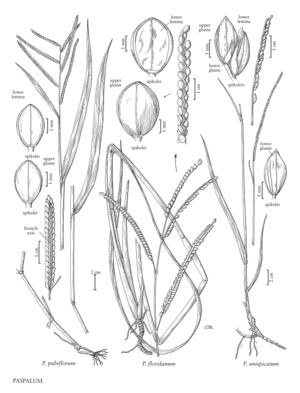Difference between revisions of "Paspalum pubiflorum"
FNA>Volume Importer |
imported>Volume Importer |
||
| Line 24: | Line 24: | ||
-->{{Treatment/Body | -->{{Treatment/Body | ||
| − | |distribution=Md.;Kans.;Okla.;Colo.;Miss.;Tex.;La.;W.Va.;Pa.;Mo.;Ohio;Ala.;D.C;Tenn.;N.C.;S.C.;Va.;Ark.;Ill.;Ga.;Ind.;Ky.;Fla. | + | |distribution=Md.;Kans.;Okla.;Colo.;Miss.;Tex.;La.;W.Va.;Pa.;Mo.;Ohio;Ala.;D.C.;Tenn.;N.C.;S.C.;Va.;Ark.;Ill.;Ga.;Ind.;Ky.;Fla. |
|discussion=<p><i>Paspalum pubiflorum</i> grows on the edges of forests and in disturbed areas. It is native to the southeastern United States, Mexico, and Cuba.</p> | |discussion=<p><i>Paspalum pubiflorum</i> grows on the edges of forests and in disturbed areas. It is native to the southeastern United States, Mexico, and Cuba.</p> | ||
|tables= | |tables= | ||
| Line 42: | Line 42: | ||
|illustrator=Linda A. Vorobik;Cindy Roché | |illustrator=Linda A. Vorobik;Cindy Roché | ||
|illustration copyright=Utah State University | |illustration copyright=Utah State University | ||
| − | |distribution=Md.;Kans.;Okla.;Colo.;Miss.;Tex.;La.;W.Va.;Pa.;Mo.;Ohio;Ala.;D.C;Tenn.;N.C.;S.C.;Va.;Ark.;Ill.;Ga.;Ind.;Ky.;Fla. | + | |distribution=Md.;Kans.;Okla.;Colo.;Miss.;Tex.;La.;W.Va.;Pa.;Mo.;Ohio;Ala.;D.C.;Tenn.;N.C.;S.C.;Va.;Ark.;Ill.;Ga.;Ind.;Ky.;Fla. |
|reference=None | |reference=None | ||
|publication title= | |publication title= | ||
|publication year= | |publication year= | ||
|special status= | |special status= | ||
| − | |source xml=https:// | + | |source xml=https://bibilujan@bitbucket.org/aafc-mbb/fna-data-curation.git/src/bb6b7e3a7de7d3b7888a1ad48c7fd8f5c722d8d6/coarse_grained_fna_xml/V25/V25_1492.xml |
|subfamily=Poaceae subfam. Panicoideae | |subfamily=Poaceae subfam. Panicoideae | ||
|tribe=Poaceae tribe Paniceae | |tribe=Poaceae tribe Paniceae | ||
Revision as of 23:02, 27 May 2020
Plants perennial; usually decumbent, rooting at the nodes. Culms 30-130 cm, decumbent; nodes glabrous or pubescent. Sheaths glabrous or pubescent; ligules 1-3.2 mm; blades to 31 cm long, 4-18 mm wide, flat, glabrous, with a few hairs behind the ligules. Panicles terminal, with 2-7 racemosely arranged branches; branches 2.2-7.9 cm, divergent to spreading, terminating in a spikelet; branch axes 1.1-2.3 mm wide, narrowly winged, glabrous, margins scabrous. Spikelets 2.8-3.6 mm long, 1.5-2 mm wide, paired, imbricate, appressed to divergent from the branch axes, elliptic to obovate, pubescent or glabrous, light brown to stramineous. Lower glumes absent; upper glumes and lower lemmas glabrous or sparsely pubescent, hairs shorter than 0.1 mm, 3-veined, margins entire; lower lemmas lacking ribs over the veins; upper florets stramineous. Caryopses 1.8-2 mm, golden brown or white. 2n = 60, ca. 64.
Distribution
Md., Kans., Okla., Colo., Miss., Tex., La., W.Va., Pa., Mo., Ohio, Ala., D.C., Tenn., N.C., S.C., Va., Ark., Ill., Ga., Ind., Ky., Fla.
Discussion
Paspalum pubiflorum grows on the edges of forests and in disturbed areas. It is native to the southeastern United States, Mexico, and Cuba.
Selected References
None.
